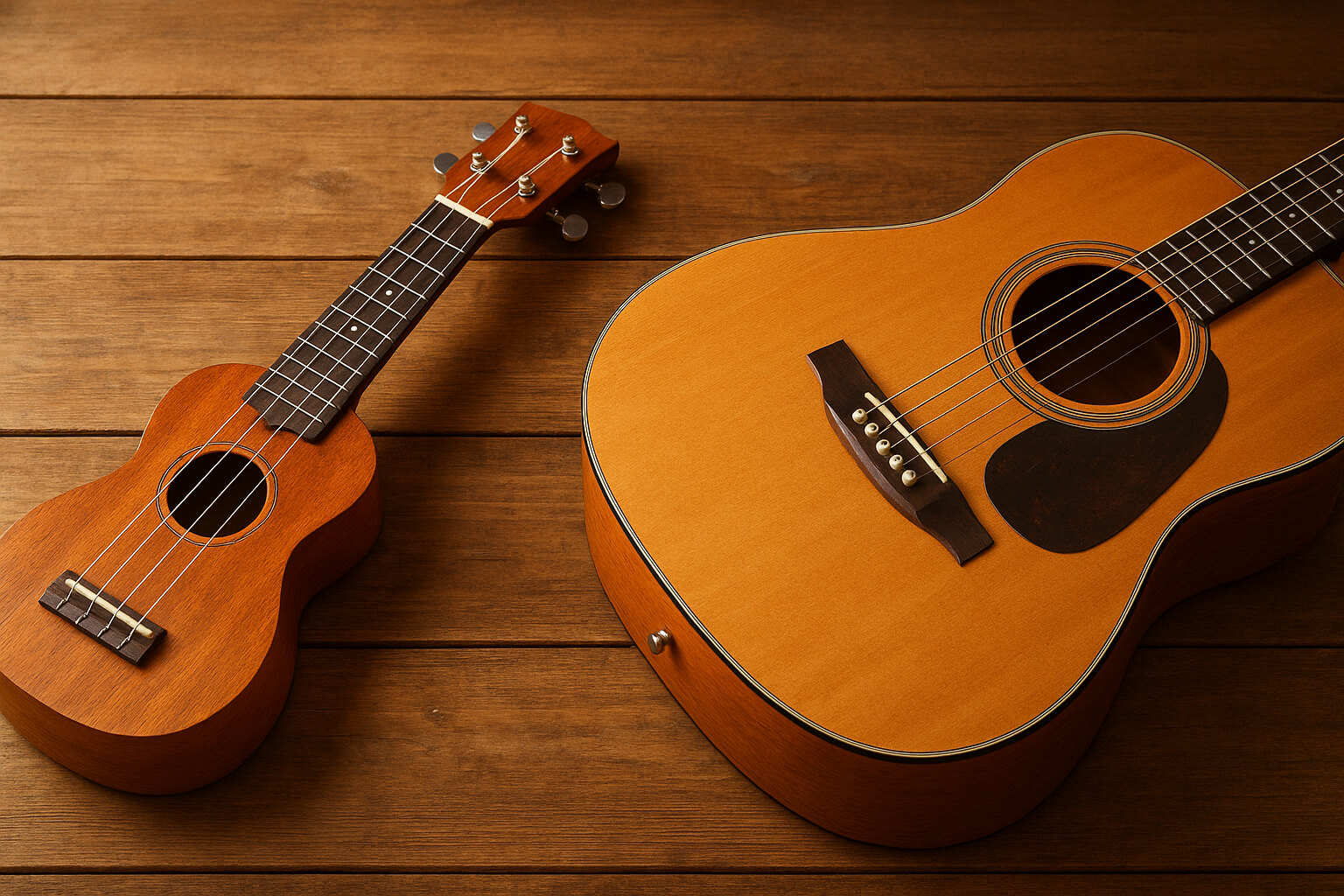Ukulele vs Guitar: Which Should You Learn First?

If you're ready to dive into the world of string instruments, chances are you're torn between two highly accessible favorites: the ukulele and the guitar. They're both widely loved for their musical versatility, rich tones, and sing-along potential — but they offer very different learning experiences.
So, which should you pick as your first instrument? Let’s explore every angle — size, tuning, difficulty, sound, cost, and long-term value — so you can choose the instrument that truly suits you.
1. Size, Shape & Portability
Ukulele
- Typically measures 21 to 26 inches, depending on type (soprano, concert, tenor).
- Light and extremely portable — easy for travel, backpacks, or even kids’ laps.
- Ideal for younger learners or those with smaller hands.
Guitar
- Standard acoustic guitars range from 36 to 41 inches long.
- Heavier, bulkier, and may be uncomfortable for small beginners.
- Travel-sized guitars exist, but still require a case and more carrying effort.
If portability matters — like taking your instrument to school, work, or the beach — the ukulele wins this round.
2. Strings, Tuning & Technical Simplicity
Ukulele
- 4 nylon strings tuned to G–C–E–A (re-entrant or linear).
- Fewer strings = easier chord shapes, less finger stretching.
- Soft strings are easier on fingers — great for beginners of all ages.
Guitar
- 6 strings, typically steel (acoustic) or nylon (classical), tuned E–A–D–G–B–E.
- Chord shapes require more finger coordination and strength.
- Beginners may experience soreness or fingertip pain for the first few weeks.
Want an easier learning curve and quicker gratification? The ukulele is far more beginner-friendly.
3. Sound & Style Versatility
Ukulele
- Bright, light, bouncy tone — often described as happy or tropical.
- Excellent for pop, folk, Hawaiian, indie, and acoustic singalongs.
- Not ideal for aggressive or dark-toned genres (e.g., metal or blues).
Guitar
- Warm, rich, and dynamic sound with deeper bass.
- Works in every genre: rock, blues, classical, country, metal, flamenco, jazz, and more.
- Larger tonal range (due to more strings) and better dynamic control.
Love blues riffs, epic solos, or fingerstyle playing? The guitar offers more expressive range and long-term stylistic growth.
4. Learning Curve: What’s Easier to Start With?
Ukulele
- Simpler chord shapes and smaller frets make playing feel natural.
- Most beginners can play 3-chord songs within 1–2 weeks.
- Perfect for casual learners or those intimidated by complex instruments.
Guitar
- Takes longer to master beginner chords (F, B, barre chords).
- Finger soreness is common in the beginning due to steel strings and larger fretboard.
- However, early struggles often pay off with broader musical opportunities later.
Many teachers agree: If quick wins keep you motivated, start with ukulele. If you’re in it for the long haul, guitar is worth the grind.
5. Cost: What’s Budget-Friendly?
Ukulele
- Beginner-friendly models: $40–$100 (brands like Kala, Donner, Enya)
- Low maintenance — no truss rod adjustments or complex parts.
- Minimal accessories needed (maybe a gig bag and tuner).
Guitar
- Beginner guitars: $120–$300 (brands like Yamaha, Fender, Cordoba)
- May require more accessories: case, strap, tuner, capo, picks, etc.
- Steel strings need more frequent replacement.
On a tight budget? Ukulele wins — it offers more bang for fewer bucks.
6. Transitioning & Long-Term Growth
Start with Ukulele:
- Easier entry into music and rhythm
- Develops basic chord fluency and strumming patterns
- A great stepping stone to guitar — some chord shapes are transferable
Start with Guitar:
- Builds finger strength, hand dexterity, and familiarity with music theory
- Sets a strong foundation for bass, electric guitar, and other string instruments
- Prepares you for advanced techniques like soloing, fingerpicking, and songwriting
Want to be a well-rounded player or future multi-instrumentalist? The guitar offers more upward mobility — but the ukulele makes starting fun and frictionless.
Helpful Tools & Learning Resources
Final Verdict: Ukulele vs Guitar — Which Should You Learn First?
Pick the Ukulele If You…
- Want to start playing songs fast
- Are looking for a portable, friendly, fun entry point
- Are teaching kids or casual learners
- Enjoy pop, folk, or light acoustic music
Pick the Guitar If You…
- Want long-term flexibility across genres
- Are willing to work through early physical challenges
- Dream of performing, recording, or writing full arrangements
- Prefer richer tone and deeper dynamics
There’s no wrong choice — only the one that keeps you excited to pick it up every day.
